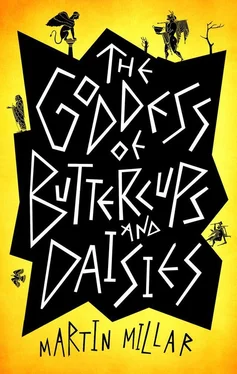They must have bribed the attendants to let them in, so they could send up the doll to humiliate me. If I don’t do something quickly we’re doomed.
The actors onstage had been thrown badly off their stride. The play was grinding to a halt and the audience were starting to jeer. At the foot of the stairs Aristophanes ran into Bremusa. It gave him a sudden inspiration.
‘I need you to pretend to be the Goddess of Peace!’
‘What?’
Above them they could hear Trygaeus fumbling for words. It wasn’t going that well.
‘I have to send something life-size up there. Get on the platform!’
‘Why me?’ said Bremusa.
‘You’re the only woman in the vicinity!’
‘I’m not doing it.’
‘You have to! If you don’t the play will fail!’
Bremusa glared at him. Aristophanes caught her on a weak point. She had been instructed by the goddess to help him. Aristophanes bundled her onto the platform and yanked the rope.
‘Take her up!’ he cried, then sprinted back to the stairs. He was gasping for breath by the time he made it back to the wings. Fruit and vegetables were again raining down but Philippus, despite his faults, was a plucky performer, one who’d faced an angry audience before. He stood his ground, and improvised as best as he could.
‘I’m sure, citizens, that the real goddess we’re just about to rescue will be a stupendous creature… Look! The cave is opening again! Here is our beautiful Goddess of Peace!’
The trapdoor opened and up came Bremusa, Amazon warrior, with a scowl on her face, a sword in her hand, and a dagger in her belt.
‘What?’ said Hermogenes, and looked very doubtful. Aristophanes, however, had a feeling that this would go well. The audience were silent for a moment. There were a few comments from the front rows.
‘I must say, she’s very life-like.’
‘Where did they get that costume? It must be eight hundred years old.’
‘Why is the Goddess of Peace carrying so many weapons?’
‘Is it meant to be satirical?’
‘I think it’s funny.’
It was funny. As the Goddess of Peace, in armour, with a sword in her hand, scowled out at the audience, looking like she might cleave anyone in two if they annoyed her, the audience began to laugh. The absurdity of it fitted the tone of the play, so much so that Aristophanes wondered if it might have been a better idea to go in that direction from the beginning.
He turned to Hermogenes. ‘We’re getting away with it… for Zeus’s sake, get the play moving before we lose the audience again. Is Mnesarete ready to go on?’
‘She’s disappeared.’
‘What?’
‘She’s gone. I think someone might have bribed her to leave.’
Aristophanes glared at Hermogenes. ‘Do you have to give me bad news every time you open your mouth? What sort of assistant are you?’
‘It’s not my fault.’
‘Of course it’s your fault. You’re my assistant! You should have known that Hyperbolus and his cronies might bribe Mnesarete. Unlikely though it may have seemed at the time. What are we going to do now? ‘
Aristophanes cursed, very loudly. What was the world coming to if you couldn’t trust a prostitute?
Muses, daughters of Zeus, let us hymn the blessed ones with immortal songs.
Luxos the Poet lay on the ground, happy but drained. Metris the nymph was kneeling beside him. She put her face close to his.
‘Your poem was so good! The audience loved you.’
‘I feel weak,’ mumbled Luxos.
‘I’ll make you better,’ said Metris. She kissed him. Luxos felt strength returning to his limbs.
‘Won’t this make Athena angry again?’ he said.
‘How could she mind, after your beautiful poem?’
They kissed again, quite oblivious to the whirlwind of theatrical activity happening all around, as characters rushed on and off stage, and props were carried here and there. Onstage, the chorus was going through one of their dance routines, and the audience were cheering and clapping along.
With Mnesarete treacherously departed — Aristophanes would have some strong words to say to Theodota about that — they needed a beautiful young woman quickly. That was a problem.
‘Find someone beautiful!’ he yelled.
‘Like who?’ said Hermogenes. ‘We didn’t bring an extra supply.’
Aristophanes fretted. What could he do? Who could he send on? Bremusa? He shook his head. She was an attractive woman but fierce, and not suitable to offer as a bribe to the judges. Besides, his whole strategy was to send out someone practically naked, and he knew she wouldn’t do that. Aristophanes had never seen her in anything but her leather armour. He was briefly distracted by the thought of what she might look like without it. He shook his head. No time for that at the moment.
He could send on a man in a female mask and costume. That was standard practice for any speaking role, as there were no female actresses. Some of their young actors made not a bad job of acting the female parts. But it wasn’t going to be enough for what he had in mind.
He noticed Luxos and Metris, embracing on the floor. Aristophanes studied the nymph. There was no denying that she was a gorgeous young creature. Too gorgeous to be kissing Luxos, he thought, even though he was feeling more sympathetic to the young wretch, after his poetry had saved the day. Aristophanes was still amazed that he’d turned out to have talent. Not only had his hymn to Athena been a beautiful piece, he’d declaimed it perfectly, and his lyre music had been excellent.
He stepped up and addressed the couple, raising his voice above the commotion in the theatre. ‘Young lady, kindly stop kissing that malcontent and listen closely. I need someone shapely and attractive to get out there and shake herself at the judges. You’ll just about do. Also, you have to be nearly naked.’
Metris looked up from the floor. ‘How naked exactly?’
‘As close as we can get without breaking festival law.’
‘What does that mean?’
‘We’ll give you a piece of string.’
She sat up, as did Luxos.
‘Why should I do that?’
‘To help my play.’
Metris didn’t look all that interested in helping his play.
‘I’ll pay you well.’
That did seem to make more of an impression. There was a pause as she considered it. The chorus was coming to the end of their song. They needed someone onstage soon.
‘Are you going to let Luxos have the poetry spot before your play at the next festival?’ asked Metris.
‘No,’ said Aristophanes.
‘Then I’m not doing it.’
The chorus were finishing. Aristophanes needed this woman onstage right now, damn her. ‘All right! If I win the prize, I’ll let him recite again!’ He turned to Hermogenes. ‘Bring the tiny costume.’
‘It’s all right,’ said Metris, springing to her feet. She smiled broadly. She had a dazzling smile. ‘I don’t need your costume.’
She stepped behind a wooden pillar. A few seconds later, she stepped out again. How she did what she did, no one could tell, but they had rarely seen such a sight. Her clothes had vanished and she was dressed in a costume which amounted to no more than nine or ten daisies, strategically placed, and attached by some magical means known only to nymphs. While wearing only a few flowers, she’d also caused her hair to be filled with them, so that it rose and spilled over her shoulders in a great wave of buttercups and daisies. Aristophanes gazed at her, astonished at the transformation. So did Hermogenes, and everyone else backstage. It really seemed as if some festive goddess had decided to pay them a visit. No one had ever seen anyone more beautiful. Not only was she beautiful, she seemed to project an aura that spread warmth and happiness around her. Previously stressed stagehands began to smile. Her beauty and warmth produced an overwhelming eroticism — so overwhelming that Aristophanes was obliged to shake his head vigorously to remind himself that they still had a play to finish.
Читать дальше












